Australia’s Forgotten 1980 Olympians Finally Recognised After Divisive And Disastrous Moscow Saga
It was a diminished and puzzled Olympic team that left Australian shores in 1980 under a cloak of darkness, some heading off to secret training camps receiving death threats and branded as traitors as they prepared for the Moscow Games.
Their blazers hidden in their luggage with a coat of arms tucked away rather than sitting proudly on their chests.
MOSCOW OLYMPIC SWIM and DIVING TEAM: The 1980 Australian Swimming and Diving Olympic Team. Photo Courtesy Michelle Ford Collection.
Some, like swimmer Michelle Ford, just teenagers thrust into the middle of a political stoush that would decide their sporting futures.
It followed the Soviet invasion of Afghanistan and the Australian Government led by then Prime Minister Malcolm Fraser publicly pressuring the Australian Olympic Federation (now Australian Olympic Committee), member sports and athletes to boycott the Moscow Games.
The Australian government joining many other western nations including the USA to make the boycott call.
But the Australian Olympic Federation had other ideas and after months of intense political and media pressure, the AOF voted to send a reduced team of 121 athletes in 17 sports.
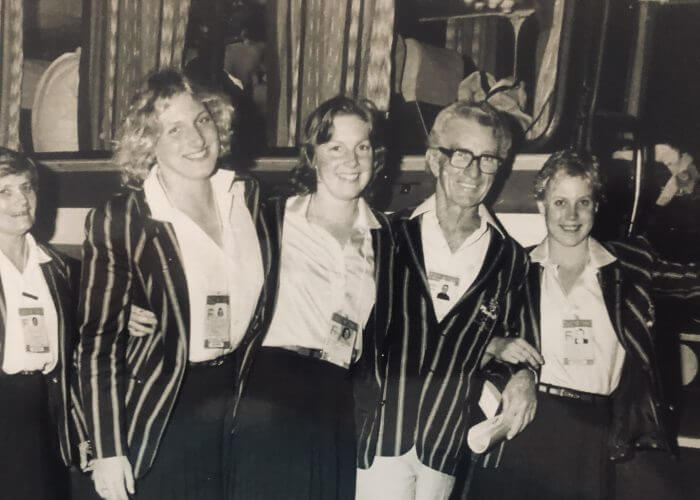
BRAVEHEARTS: Swimmers (L-R) Karen Van Der Graaf, Michelle Ford and Lisa Curry with coach Joe King and Manager Isa Wye (far left). Photo Russ McPhedran (Hansin Media Collection)
The whole saga described by current Australian Olympic Committee boss Ian Chesterman as “a disastrous and divisive collision of sport and politics…. that put our athletes, sports and officials in the worst possible position.”
Some sports and individual athletes withdrew from the team – bowing to financial handouts and pressure to stay at home – those that went receiving death threats for deciding to represent their country in the biggest sporting event in the world.
The team returned with nine medals – two gold, two silver and five bronze – the gold to Ford and the men’s 4x100m medley relay team of Mark Kerry, Mark Tonelli, Peter Evans and Neil Brooks.
And the five bronze medals to the swim team as well: Graeme Brewer (200m freestyle); Max Metzker (1500m freestyle); Evans (100m breaststroke); Kerry (200m backstroke) and Ford (200m butterfly).
They returned home without any fanfare, no welcome home parade and shunned by sections of the Australian public.
Still traumatised by the events of 1980, a group of Moscow Olympians including Ford, Metzker and decathlete Peter Hadfield have led the charge for formal acknowledgement, with the AOC liaising closely with the Government and Opposition to support the recognition.
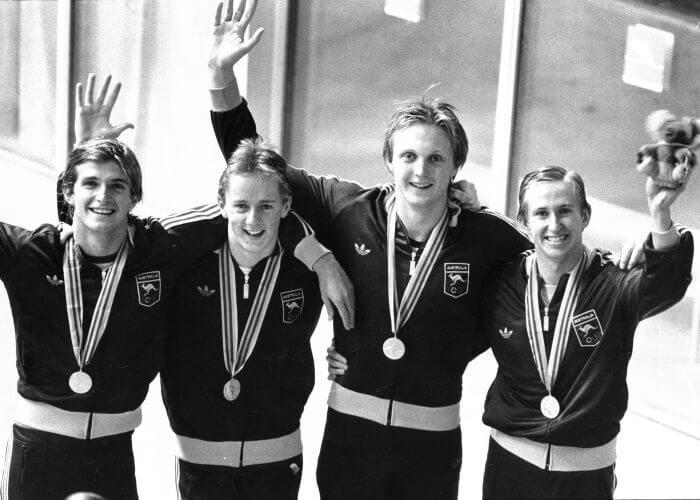
MOSCOW RELAY GOLD: Australia’s victorious 4 x 100m Medley Relay 1980 Moscow: L-R Mark Kerry, Peter Evans, Neil Brooks, Mark Tonelli. Photo Russ McPhedran Courtesy Hanson Media Collection.
And today, some 45 years after the Moscow Games, The Australian Prime Minister Anthony Albanese and Opposition Leader Susan Ley will recognise the 1980 Australian Olympic Team that defied intense public pressure to take part in the controversial Games and acknowledge those athletes who were denied the opportunity to compete.
Around 50 Moscow Olympians, their families, Team officials and coaches traveled to the nation’s capital, Canberra to witness the recognition, which coincides with the 45-year anniversary of the Moscow Games.
Australian Olympic Committee President, Chesterman said the parliamentary recognition would acknowledge the courage and resilience of the Olympians who faced intense public pressure not to compete, and the enduring hurt and pain many of them still feel to this day.
“In many ways, this recognition, from the floor of the Federal Parliament, will be the welcome home celebration the athletes never got,” Chesterman said.
“Instead of the celebrations our Olympians normally arrive home to, they endured threats, feelings of shame, public condemnation and arrived home to silence.
“Although it’s been 45-years in the making, I know how much today’s recognition will mean for the Olympians, coaches and officials, and how emotional it will be for many.
“But they fulfilled their dream in attending the Games and, in doing so, maintained Australia’s representation at the Olympics. Because of them we are one of only two countries, along with Greece, to have sent athletes to every summer edition.
“My thoughts also go to those athletes who qualified, and were selected, but did not attend the Games, many due to decisions made by National Sporting Organisations under the pressure of the day. The devastation those athletes experienced is real, and for many remains today, so we acknowledge them as selected Team members and victims of the political environment of that time.“
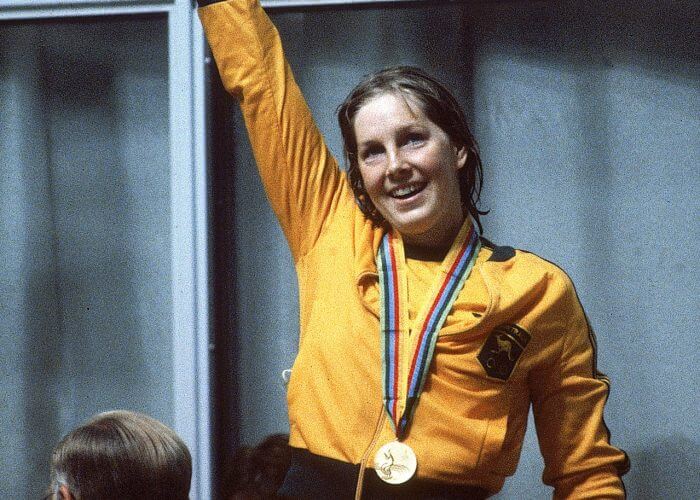
MOSCOW FREESTYLE GOLD: Michelle Ford on the gold medal podium. Photo Courtesy Russ McPhedran (Michelle Ford Collection)
“We can never again ask our athletes to be sacrificed for political purposes. The Olympic Games demonstrates how nations of the world can come together in peace. Athletes from 206 nations competing, and living, side by side. It is a rare symbol of what is possible, an enduring benefit of sport and the Olympic Games, and something to be treasured.
“We can’t change what happened, but we will work to ensure the independence of the Australian Olympic Committee is always protected and this sorry tale never happens to one of our teams again.
“We thank the Prime Minister, the Opposition Leader and the Parliament for their leadership and courage today and hope it helps our Moscow Team and affected athletes to move forward and understand they are truly appreciated.”
Ford reflected on the most difficult chapter of her storied career.
“We were preparing to represent our country at the Olympic Games, the world’s greatest sporting event, but instead of support we were met with hostility and abuse,” said Ford, who turned just 18 during the Games and was the only Australian to win an individual gold medal.
“We were branded traitors, vilified, shamed and ridiculed. I even received a death threat.
“When the time came time to depart, we were forced to sneak out of the country to avoid media and protestors.
“The memories of that time remain tainted by the pain and anguish we experienced and have carried with us for 45-years.”
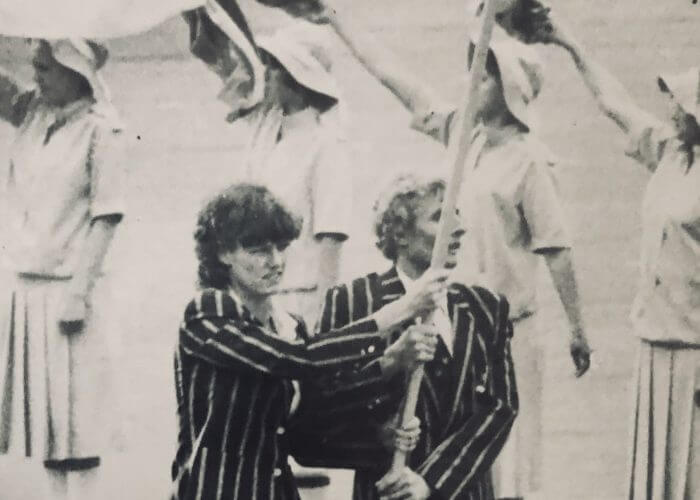
TOGETHER AS ONE: Moscow Opening 1980 Max Metzker and Denise Robertson Boyd.Photo Russ McPhedran (Hanson Media Collection).
Metzker, who with sprinter Denise Robertson Boyd, led the Australian team in the Opening Ceremony, marching under the banner of the Olympic flag – a message to the hosts that their country didn’t support their actions.
“The mental toll on us was crippling, and for many, has continued to linger for decades,” said Metzker.
“Our hope is that the recognition today helps heal those mental scars.”
Hadfield saying: “While it has taken 45-years, and sadly a number of our teammates have passed, the fact that 50 Moscow Olympians, now in their 60s, 70s and even 80s, are coming to Canberra to hear the speeches from the Prime Minister and Opposition Leader, tells you how much it means to us all.”
To make the circumstances more tragic, while the AOF voted to send the Team, several individual sport federations decided to abide by the Government’s boycott and not send athletes. Thus, 62 Australian athletes did not get the opportunity to attend the Moscow Games and 17 never had another chance to become an Olympian.
In support of the 1980 athletes, the Parliamentary recognition will be attended by IOC Athletes’ Commission Member and triple Olympic Champion Jessica Fox,AOC President Ian Chesterman, AOC Honorary Life President and 1980 Team Administration Director John Coates, 1980 Olympic swimmer Ron McKeonsupported by his daughter Emma McKeon, Australia’s most decorated Olympian, and son dual-Olympian David McKeon, both the current day summer and winter Team Chefs de Mission Anna Meares and Alisa Camplin, AOC Indigenous Advisory Committee Chair Patrick Johnson, AOC CEO Mark Arbib together with Australian sporting sector leaders.
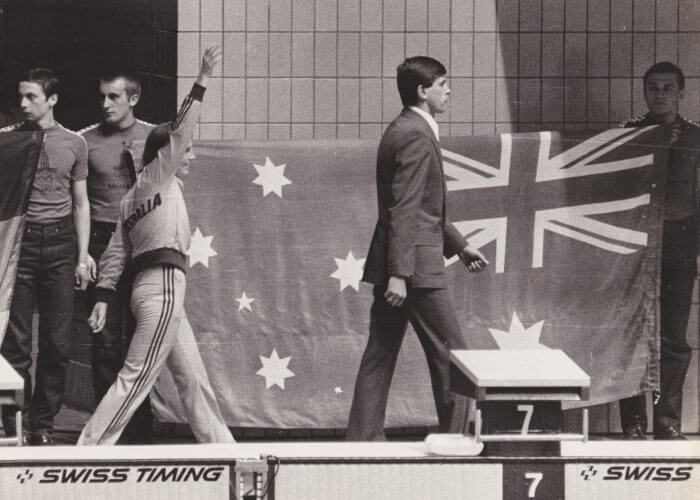
SALUTE FROIM THE OLYMPIC CHAMPION: Michelle Ford flagged for success. Photo Courtesy Russ McPheran (Michelle Ford Collection
